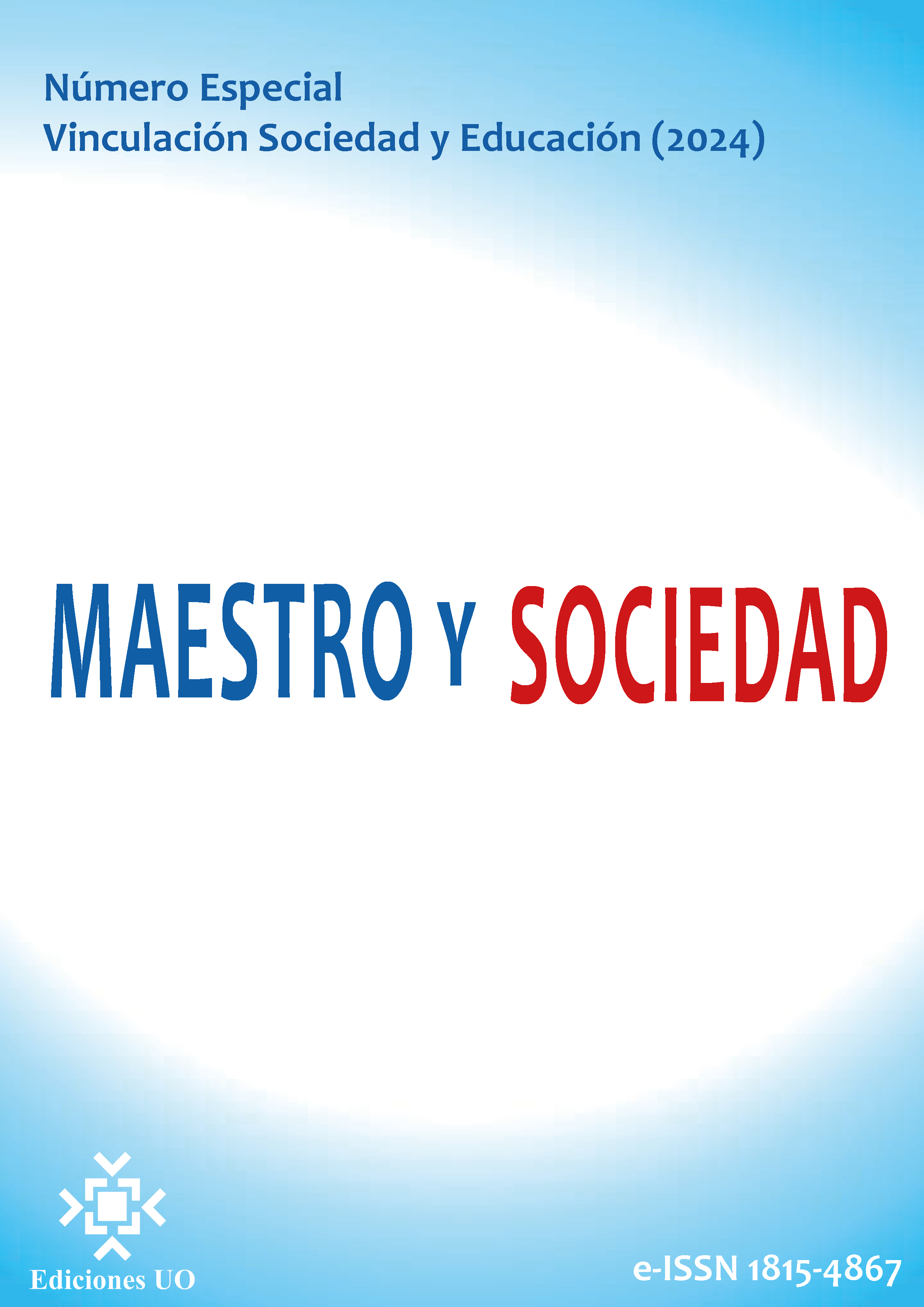La familia y las relaciones interpersonales en la infancia preescolar
Palavras-chave:
familias, relaciones interpersonales, niños, infancia preescolarResumo
Introducción: El presente estudio considera las insuficiencias que se presentan en las relaciones interpersonales de los niños de la infancia preescolar. Estas limitan el logro de un buen desarrollo emocional, físico, social y psicológico. Se observan carencias de naturaleza teórico y práctica en el establecimiento de adecuadas relaciones en el hogar. Materiales y métodos: Las que se derivan a partir de la aplicación de los métodos teóricos y empíricos, tales como análisis y síntesis, la revisión de documentos, observación, entrevistas y matemáticos estadísticos, el cálculo porcentual. Resultados: Para dar respuesta a la problemática que se expresa, los principales resultados a partir de la elaboración y ejecución de una propuesta de acciones educativas, que permiten enriquecer la preparación dirigida a las familias de los niños y niñas de la infancia preescolar, en el contexto actual, que favorece el cambio de actitudes comportamentales en los miembros de las familias y los niños. Discusión: Un estilo de vida saludable se puede alcanzar en el sistema de las relaciones sociales, en el contexto de la convivencia social, y este juega un papel preponderante en su construcción, pues el estilo de vida que se asuman por los individuos desde las primeras edades contribuirá o no, a las adecuadas relaciones interpersonales del sujeto dentro de la convivencia, influyendo en su salud, desarrollo personal, profesional y social. Conclusiones: La familia se constituye en uno de los espacios intergeneracionales más importantes para el cambio social, debido a que, en este espacio, las nuevas generaciones reciben el apoyo de los adultos para aprender a descubrir los valores que están presentes en la vida cotidiana.
Referências
Calderón Ibáñez, Y., Conesa Santos, M., Suarez Pedroso, M. y Figueroa Carbonell, A. C. (2019). La preparación de la familia para el desarrollo de la labor educativa. https.//www.eumed.net.
Canaval Zúñiga De Hernández, C. Milagros (2019). Programa Educativo para mejorar las relaciones interpersonales en estudiantes de Educación Primaria de una Institución Educativa Particular Trujillo
Noda Alonso, S. (2023). Jornada de Maternidad y Paternidad por una convivencia en equidad. http://www.cuba.cu.
Ramírez Agurto, J. N. y Tesén Arroy, J. (2022) Las relaciones interpersonales y la calidad educativa, TecnoHumanismo. https://dianet.unirioja.es/servlet/articulo?codigo=8356012
República de Cuba, (2021, 8 de marzo). Programa Nacional adelanto para la Mujer. Ministerio de Justicia. http://www.gacetaoficial.gob.cu/
República de Cuba. (2022, 17 de agosto). Ley 156/2022, Articulo 2. Código de las familias. Gaceta Oficial No. 87. https://www.tsp.gob.cu/documentos/gacetaoficial-no-87-ordinaria-de-2022-ley-1562022-codigo-de-las-familias?fbclid=IwAR3jJL_4mkPXzfuvGQVkY4JzfxWjxdQ
Toro Jaramillo, L. F. y Rojo Vivares, J. A. (2020). Fortalecimiento de las relaciones interpersonales desde los lenguajes expresivos por medio de estrategias lúdico pedagógicas en la institución educativa Jesús María - El Rosal. https://dspace.tdea.edu.co/handle/tdea/781
Publicado
Como Citar
Edição
Seção
Licença
Copyright (c) 2024 Elianne Wilson Megret, Circe Sánchez Rodríguez, Ariolki Fumero Pérez

Este trabalho está licenciado sob uma licença Creative Commons Attribution-NonCommercial-NoDerivatives 4.0 International License.
Esta revista proporciona un acceso abierto inmediato a su contenido, basado en el principio de que ofrecer al público un acceso libre a las investigaciones ayuda a un mayor intercambio global de conocimiento. Cada autor es responsable del contenido de cada uno de sus artículos. Los artículos pueden ser inéditos o estar disponibles previamente en servidores de preprints reconocidos por la revista. Sin embargo, no se permite la duplicación de la publicación o traducción de un artículo ya publicado en otra revista o como capítulo de un libro.
This journal provides immediate open access to its content, based on the principle that providing the public with free access to research supports a greater global exchange of knowledge. Each author is responsible for the content of each of their articles. Articles may be previously unpublished or available on preprint servers recognized by the journal. However, duplication of publication or translation of an article already published in another journal or as a book chapter is not permitted.
Esta revista oferece acesso aberto imediato ao seu conteúdo, com base no princípio de que oferecer ao público acesso gratuito à pesquisa contribui para um maior intercâmbio global de conhecimento. Cada autor é responsável pelo conteúdo de cada um de seus artigos. Os artigos poderão ser inéditos ou estar previamente disponíveis em servidores de preprints reconhecidos pela revista. No entanto, não é permitida a duplicação de publicação ou tradução de artigo já publicado em outro periódico ou como capítulo de livro.



























 Universidad de Oriente
Universidad de Oriente 